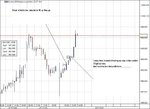BSD
Veteren member
- Messages
- 3,819
- Likes
- 988
The greatest trick the devil ever pulled, was convincing the world he didn't exist.
Suppose I move my stop to breakeven after I'm in a trade for 1 minute and suppose I hardly get stopped out before that minute what would that say about my "risk" (I might get a lot of BE trades but that's beside the point in this particular example)?
Mate, don't get me wrong, but I'm not really into a lot of woulda-coulda-shoulda theories...
All I am on about is saying that high hit rate AND high R/R PLUS scalability cannot co-exist, that no such proof has ever existed...
AND that having high winning % PLUS high R/R is also ABSOLUTELY irelevant for those who want to make the most money, that it is nothing than only a pipe dream sought after with the hope of offering comfort for those who have a need to being right way over wanting to make the most money...
BUT to be fair I will gladly eat a hat, AND pester Mr Tudor Jones to give the guy or gal a job that will make them almost as rich as if they started their own hedge fund...
IF someone pops up here who has more on offer than theories, who can't just talk a beguiling talk, BUT ACTUALLY WALK THE WALK.
WHo can open an account, trade that one year, and show us PROOF.

